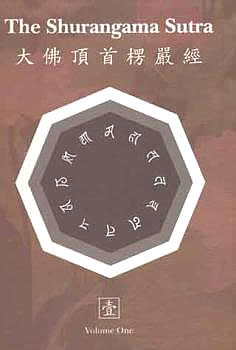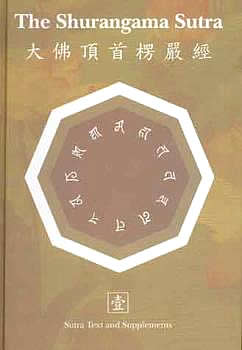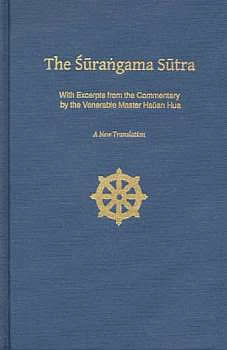 |
|
The Importance of the Shurangama Sutra
A talk given by Brooks Hansard on July 3 (Monday), 2011 at CTTB


Good evening all Good and Wise Advisors, Amitofo,
I was recently having a discussion with a volunteer and we were talking about the Shurangama Sutra. I told him that the reason I am at CTTB now is due to the Shurangama Sutra. In 2003 I dedicated lots of my time to reading the Sutras. I read all of the major Mahayana Sutras that are available in English and many of the sutras in the Pali Canon also. Eventually I came across the Shurangama Sutra, which Dr. Epstein has made available on the internet.
Reading the sutra really changed how I viewed the Dharma and the Path. First of all, it exposed deviant teachers and deviant teachings. Before reading the Shurangama Sutra, I didn't know that there was such a distinction between Proper Dharma and Improper Dharma. I gained the Dharma-selecting Eye after reading the Shurangama Sutra, and for that I am very fortunate. The fact that the Venerable Master first taught the Shurangama Sutra when instructing his first Western disciples reveals his wisdom and insight. The Shurangama Sutra exposes the greatest weaknesses that have arisen in modern Buddhism, especially in the Mahayana tradition.
I was telling my friend the reasons why I think the Shurangama Sutra is so vital to the future prosperity of Dharma in the world. One important reason is because it focuses on the moral precepts. Before coming across the Shurangama Sutra, although I was aware that precepts were a part of the Path, I didn't know that they played such a vital role. I didn't realize that precepts are the very foundation of the entire Path, and that without precepts, you aren't truly making progress towards Bodhi. You can certainly make progress on a path without upholding precepts, but such a path won't lead to Bodhi, it will lead to something else much less desirable.
In the West's modern discourse on Dharma, there is no discussion about precepts. You simply won't hear it anywhere. You'll hear lots of Zen talk and lots of Prajna prattle. You'll hear discussions about no-self and compassion and emptiness, but you won't hear anything about becoming a better person, about developing virtue and goodness, about purifying one's mind of all unwholesome thoughts and purifying one's body of all unwholesome deeds. Such a conversation simply doesn't exist right now in the West.
My friend told me how at meditation centers, during the breaks, the participants will go into the woods and take drugs, and then after the break ends they come back to meditate. In my opinion, the underlying problem with all this is a failure to see what the cause of ignorance is. I don't think newcomers to Buddhism are able to make a connection between ignorance and the breaking of precepts. I think if they could make that connection, they would quite naturally want to uphold precepts because they would see their importance for overcoming ignorance and suffering.
The reason for their confusion isn't their fault though. It's the fault of those who are teaching them Buddhism. A major reason why they can't make the connection between breaking precepts and ignorance is because those who are teaching them Buddhism aren't explaining ignorance according to the way that the Buddha explained it. For instance, there is one false teaching that exists in Buddhism, which claims that ignorance is simply a matter of being attached to duality. If your mind can be free of all dualities and completely unattached, then that itself is Bodhi. Such a teaching implies that you can engage in all sorts of evil deeds, and yet because you are unattached and beyond duality, you are not creating karma and thus not planting seeds for future samsaric existence. Has this not been Mara's teaching for time immemorial? Yet people have been tricked into believing that this is the Buddha's Prajna.
It makes perfect sense that someone with such a notion of Prajna would think that precepts are unimportant. Therefore, at the beginning of any discourse about Buddhism with a newcomer, I believe it's important that we first create for them a clear understanding of what it is the Buddha intends for us to accomplish by practicing Buddhism. For instance, we aren't trying to accomplish an unattached, unfettered mind that engages in actions free from all restraint and shame. Rather, we are trying to accomplish a mind that is free from all defilements and impurity. Self-restraint and shame are not what is holding us back from liberation. It is unwholesome actions of body, mouth, and mind that are keeping us revolving in samsara. Impurity is what is keeping us ignorant and causing us to suffer. Once we can understand that suffering is due to our nature being covered over by impurities, then we can clearly see that breaking precepts is itself the cause of future suffering and ignorance. Once we can understand that the only difference between a Buddha and a worldly being is that a Buddha's nature is pure, while a worldly being's nature is impure, then we can clearly see the importance of precepts.
I have often asked people what they think enlightenment is. I will get answers such as: it's having inconceivable spiritual powers, or it's the attainment of omniscience, or it's seeing into the emptiness of self. Any demon can experience no-self, can have delusions of omniscience, and can have inconceivable spiritual powers. If this is how we define enlightenment, then of course we won't see any need for the precepts. Although the Sutras do teach that the Buddha possesses the above qualities, such definitions of enlightenment lose sight of what we are trying to accomplish.
According to the Buddha, we are trying to get rid of the impurities that cover over our intrinsic nature. The Buddha taught us that enlightenment is the ending of outflows—or klesha. The root kleshas he taught us to extinguish from our nature are greed, anger, and confusion. This is what we are trying to accomplish when we cultivate the Way. How can we claim to be on a path of purification such as this, and yet simultaneously not appreciate the need to purify our natures through maintaining precepts? Therefore, I think a major problem is that newcomers to Buddhism aren't being explained what the end goal of Buddhism is. How can we work towards the goal of liberation if we don't even know what it is? How can we appreciate the importance of virtue and purity if we don't even see how it relates to enlightenment?
Newcomers to Buddhism need to be able to equate impurity with suffering. They need to be shown that the Three Poisons—greed, anger, and confusion—are impurity in itself and that such impurity is the root cause of suffering. They need to be shown how impurity is the cause of suffering and how upholding the precepts ends suffering by purifying one's nature. By understanding what exactly enlightenment is when they are being introduced to the Dharma, they can then see how precepts are indispensable.
The Shurangama Sutra stresses the importance of precepts. Such a teaching is the antidote to the sickness that the Dharma is suffering in today's society. There is another way in which the Shurangama Sutra is vital to the Dharma today, and that is the way in which it teaches about the skandha states. I have come across many people who have had “spiritual experiences” and therefore think that they have become enlightened. This is another problem that arises because people don't know what enlightenment is. They think enlightenment consists of having a profound, spiritual experience.
One way in which the Shurangama Sutra shows the unimportance of these spiritual experiences is by changing the language. What people today call spiritual experiences, the Shurangama Sutra calls skandha states. Labeling these experiences as states puts them into their proper perspective. No one can get excited and go up to someone and say, “Oh, I had the most amazing state!” Just the word “state” in itself reveals that the spiritual experience has no real value or importance and is just one of many other fleeting states.
Within another Mahayana Buddhist tradition, skandha states are used as a measure to determine how advanced a yogi is. It teaches that as you advance through the stages in your practice, you will experience different states, and it describes the different experiences one will have as one progresses through the yogic stages. Based on this, it's no wonder people have gotten so confused about what they are trying to accomplish in Buddhism. In that tradition they actually try to attain skandha states, thinking that these are indicators of success, rather than maintaining the teaching that “the ordinary mind is the Way.”
The Shurangama Sutra cuts through this delusion, and in this way, the Shurangama Sutra is the most valuable sutra that exists in the world today, in my own opinion. It can turn people away from the improper and towards the good. It can remind people of what Bodhi truly is and teach the Path that takes one to that destination.
Another way in which the Shurangama Sutra is indispensable to the Dharma today is through its way of showing how even demons can speak eloquent Dharma. In many of the skandha states described, a skandha demon will skillfully speak Dharma. I'm sure the skandha demons teach very profound insights and really 'wow' their audiences. I think one weakness that we Westerners have is our love for ideas. Many Westerners who are drawn to Buddhism can be very intellectual and cerebral--living in their heads. Such people tend to equate insight with enlightenment. They certainly don't equate enlightenment with purity and wholesomeness. For this reason, if they come across a teaching that has deep and profound spiritual insight, they will assume that the person teaching it is a sage.
The Shurangama Sutra shatters the myth that profound, spiritual insights indicate that one is enlightened. There are many people out there who give very profound teachings, and yet the Shurangama Sutra reminds us that although such people can have profound teachings, they can still be defiled to their core. How many gurus and masters over the years have given profound teachings and yet shamelessly fallen from grace because they never placed any importance on moral precepts? Unfortunately, the number is too many to count. The Venerable Master's maintenance of purity while he was teaching is an exception to the rule, not the norm.
The Shurangama Sutra is a beacon of light that exposes all deviant teachers and deviant dharmas. My sincere hope is that more people throughout the world will encounter the Shurangama Sutra and give rise to a mind of repentance and vow to practice the Proper Path.
The following can be ordered online:
The Shurangama Sutra with commentary by the Venerable Master Hsuan Hua

